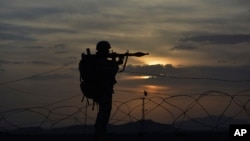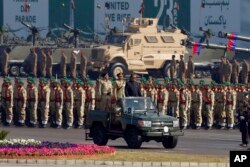The White House’s recent decision to withhold $50 million in military aid to Pakistan for failing to do enough against the Haqqani network has triggered new debate in Pakistan over the country’s war against terrorism and its military’s dependence in recent years on U.S. aid.
Since the 2001 U.S. invasion of Afghanistan, Pakistan’s military has received $30 billion in military assistance for helping crack down on groups that target international forces in Afghanistan. But U.S. officials have long complained that Islamabad has fallen short in its fight against the Haqqani network, a U.S.-designated terrorist group that many suspect has links to Pakistan’s spy agency. Some analysts say that withholding funds to pressure Islamabad is not effective.
“I think this is not something new. U.S. administrations have been using aid and coalition support funds’ disbursement as leverage against Pakistan for many years now. If this policy did not bring any results in the past, don’t expect any different results this time,” said Jahangir Khattak, a New York-based journalist.
“Despite military aid cuts, Pakistan’s military establishments will not take sincere action against Haqqani network, the one (in which) Pakistan has invested hugely for many years. Although, Pakistan is concerned about Trump’s administration possible unilateral actions, such as stepping up drone attacks and special force operations, as it did on Osama bin Laden,” said Hashim Wahdatyar, an Afghan political expert who is based in Washington, D.C.
Pakistan says it has paid the price
Pakistan argues that it has paid a steep price in the U.S.-led war on terrorism, carrying out military campaigns in remote tribal areas to push militant groups out of their strongholds. U.S. officials continue to insist that Islamabad’s help is critical for securing peace in Afghanistan.
“Recent experiences indicate that the United States cannot win the war in Afghanistan without Pakistan’s support,” said U.S. Chairman of the Joint Chiefs of Staff Gen. Joseph Dunford, last month.
Currently, Pakistan is in the middle of military operations on several fronts against the terrorists the most recent one is called Khyber-4, launched against Islamic State.
“Keeping Pakistan’s military engagements in view, the last thing they want to happen is any cuts in assistance. The issue of giving away grants and then taking them away is a bit complicated,” Khadim Hussain, a Peshawar-based political analyst, said. “The authorities in Pakistan might create trouble in the smooth flow of logistics, may start facilitating more violence in Afghanistan, and may also try to sell the Taliban to Russia and China.”
An inconsistent U.S. policy may create a space for Pakistan officials to use all the above options, some analysts say.
More dialogue needed
Journalist Khattak said there is a need for more dialogue to create a better understanding between Pakistan and the United States.
“I think the key to convincing Pakistan to stop its backing of Haqqani network may not come through sanctions,” he said. “The two sides have to take steps to remove the trust deficit that has been bedeviling their relations on quid pro quo basis. Also, key to change in Pakistan’s attitude is its relations with Afghanistan, which are currently passing through a difficult period.”





